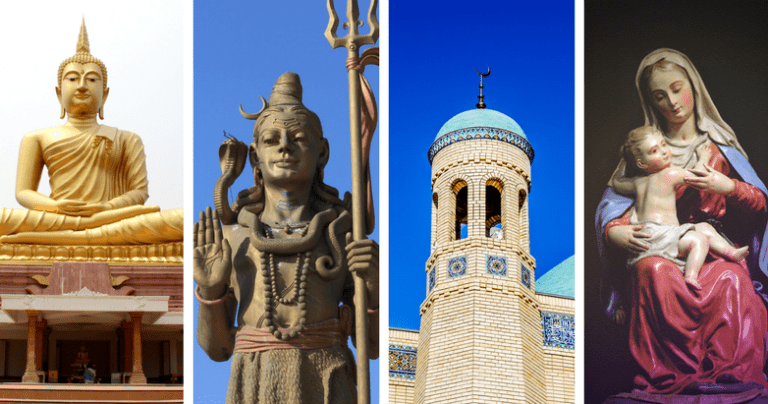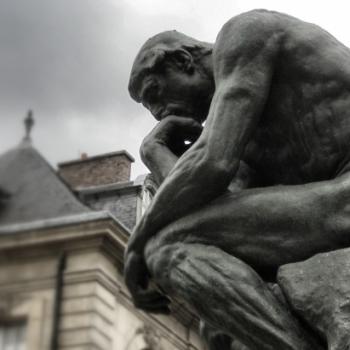
Words are the means by which we communicate. They point to things, emotions, and ideas. They help us understand each other. Words only come into being when two or more people have the same or similar experience and need to be able to talk about it. But through use, the meaning of words changes, and sometimes it is important to revisit the original intent to better understand.
Socrates reportedly said that he never wrote anything down because then he couldn’t be the steward of his words; he wanted to be present to guide people towards the real meaning of what he was saying. Although his sentiment is true upon examination, writing still one of the best means of communications we have, and in writing, as in religion, words matter.
In this article, I want to explore four examples from Buddhism, Hinduism, Islam, and Christianity.
Buddhism: Dukkha
In the modern English vernacular, the main principle of Buddhism is that life is dukkha, which is usually translated to mean that life is suffering.
But is that true?
According to Huston Smith, the original word, dukkha, means out of place, like a wheel on a cart that is off its axis, a dislocated shoulder, or something that doesn’t quite fit.
Dukkha = Out of place.
Can you see how much of a difference that translation makes?
Compare the two:
- Life is suffering.
- Life is out of place.
Totally different meanings, right?
Most of us link the word suffering to something terrible, unbearable even. How can life be that? It doesn’t make any sense.
But if life is out of place, just about everyone can agree to that, because sometimes everyone gets the feeling that life is out of place, out of sorts, like something is not quite right, like something is missing, like it doesn’t fit.
Many of those, who preach Buddhism in the West, are stuck in a difficult situation, trying to explain to people how life is suffering. If they would use the words out of place instead, they would be having a completely different dialogue.
Hinduism: Brahman
In Hinduism, the term Brahman means One Without a Second. It is a nondual concept. Everything is Brahman, the interior of the world, the exterior of the world, and everything in between.
However, in many Hindu and yoga circles, the term Brahman has been translated as God, which a problem, because, while Brahman is a nondual concept, God is a dualistic concept, derived from the word good in several languages, including German, Dutch, and Old English.
And so, when the term Brahman is translated as God, it invites misunderstanding. Brahman is reduced from its original nondual and all-inclusive meaning to a dualistic concept that has a variety of meanings for different people.
Therefore, it makes more sense to use the original word, Brahman, and explain it’s meaning rather than make the mistake of translating it as God.
Islam: Allah
In Islam, there is a different problem because one of their most important terms has not consistently been translated into English, which means that the term Allah has crept into our vernacular. We say that Muslims believe in Allah, not that Muslims believe in God.
Unfortunately, thanks in part to simplified television and movie portrayals, the term Allah has begun to sound ominous to many—as in a terrorist screaming Allah Hu Akbar as he attacks.
However, when the root word is examined, Allah, as Huston Smith explains:
“…is formed by joining the definite article al (meaning “the”) with Ilah (God). Literally, Allah means “the God.” Not a god, for there is only one.”
Allah = The God.
Now, can you imagine the difference if we used the English translation?
We would say that Muslims believe in The God.
Instead of Allah Hu Akbar, we would hear The God is Great.
It sounds like something you would hear at an Evangelical Christian church. God is great. Praise the Lord.
Hearing it that way, talking about it that way, could increase understanding, especially when we remember that the Abrahamic faiths (Judaism, Christianity, and Islam) all share the same God.
Christianity: Yeshu
As Christianity spread, cultures across the world assimilated the central figure, Jesus the Christ of Nazareth, and made him their own.
Few have done as good a job of it as the white populations in Europe and America.
Influenced by paintings, church ornaments, and beyond, many people (including myself, growing up in Iceland where he was called Jesú) could, for the longest time, only perceive Jesus as white.
It goes without saying—but I am going to say it anyway—that Jesus was a Middle Eastern man with dark skin, black hair, and features similar to his fellow men at the time. His Aramaic name was Yeshu.
The blonde haired, fair skinned, blue-eyed, Jesus of my childhood, is a figment of our imagination.
He existed historically, but as Yeshu, not as Jesus.
Imagine if we changed our current vernacular to reflect that. Not to change the teachings of Yeshu, but to change our internal image of him.
Yeshu Christ.
I follow Yeshu.
Sure, we would have to change an awful lot of t-shirts and bumper stickers, but I think it would be worth it overall. It would give us an image of Yeshu that was closer to the truth.
Words Matter
From these examples, you can see how words and their meanings influence both our external and internal dialogues. Words exist independent of us, but, in solitude, we cannot think without them.
I was a public speaker for many years, and every time I stood up in front of a crowd, I would begin my talk by defining the word that would be my primary focus for the next thirty to sixty minutes. I have definitions for stress, self-confidence, meditation, forgiveness, and other concepts. My goal was to make sure that we were all on the same page when I started talking.
Similarly to that, we would all do well to stop from time to time and reflect on the original meaning of the words we use, especially if those words form the foundation for our belief structure.
Gudjon Bergmann
Author & Interfaith Minister
p.s. Please feel free to share more examples in the comment section below.
Pictures: Pexels.com CC0 License












